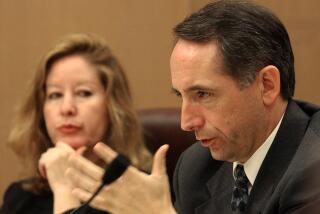Ex-Auditor Recalls Criminal Intent
- Share via
HOUSTON — A former Arthur Andersen partner testified Wednesday that he didn’t believe he was breaking the law at the time he ordered the destruction of Enron Corp. audit documents last fall, but changed his mind after a series of meetings with federal investigators and “a lot of soul-searching.”
David Duncan, formerly the top Andersen executive auditing Enron’s books, said he pleaded guilty to obstruction of justice last month and agreed to testify against his former employer after concluding that his motive for shredding files was to keep them away from plaintiffs’ lawyers and Securities and Exchange Commission investigators.
Duncan, 43, is considered the prosecution’s key weapon as it seeks to convict Andersen on obstruction of justice in federal court here for its shredding of Enron documents. A conviction would probably prompt the SEC to prohibit Andersen from auditing public companies and cripple the firm.
Andersen attorneys had their first chance to question Duncan on the stand, and spent much of the time seeking to show the accountant lacked criminal intent and only pleaded guilty out of fear.
Under cross-examination from Andersen attorney Rusty Hardin, Duncan recounted being frozen out from the firm after Andersen publicly reported the document destruction in January. Duncan said he first met with federal investigators Jan. 14, a meeting initially intended to discuss Enron accounting issues. The next day, he testified, Andersen contacted his attorneys and notified them that it planned to fire him. He said he had been unable to learn directly the status of his job.
Duncan met again with federal agents Jan. 16, and at the time, he said, he did not believe he had violated the law by asking employees to comply with the firm’s document-retention policy. But in February, Duncan said, he learned that the Justice Department had begun to consider him a target.
Duncan said he also learned that federal sentencing guidelines could mean that he could face a far longer prison sentence if convicted of other crimes, such as fraud. In late March, he said he began telling members of his family that he believed he may have committed obstruction. He said his realization came after “a lot of soul-searching about what I believed to be all of my motivations” at the time he initiated the destruction effort. He agreed to cooperate in the U.S. Justice Department probe of Enron in exchange for a potentially lighter sentence.
According to the federal statute, to be convicted of obstruction, a defendant must “corruptly persuade” others to destroy evidence to make them unavailable for an official proceeding, such as a federal investigation.
Duncan said that in October, he believed that the law allowed him to destroy records because his firm had not received a subpoena for them. But months later, “I began to realize the law was certainly not that clear cut,” he said.
Hardin, however, contends that neither Duncan nor Andersen violated the law because Duncan didn’t intend to break the law and because the SEC’s informal inquiry against Enron did not constitute an “official proceeding” directed at the Chicago-based accounting firm.
More to Read
Inside the business of entertainment
The Wide Shot brings you news, analysis and insights on everything from streaming wars to production — and what it all means for the future.
You may occasionally receive promotional content from the Los Angeles Times.










